自考英美文学选读课文翻译 莎士比亚
- 格式:doc
- 大小:31.50 KB
- 文档页数:4
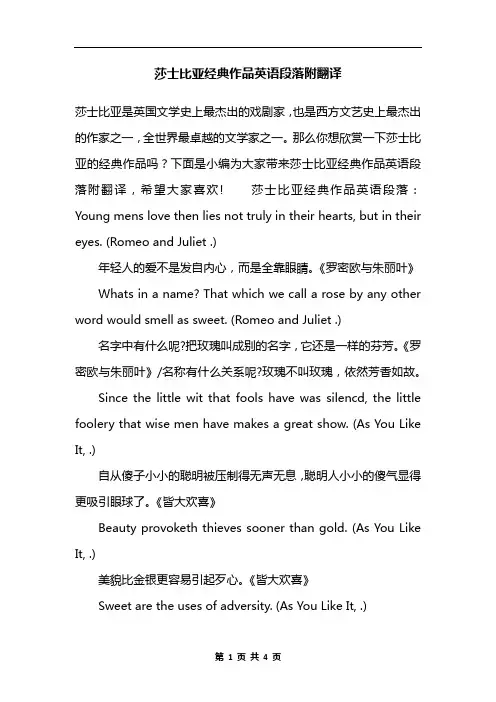
莎士比亚经典作品英语段落附翻译莎士比亚是英国文学史上最杰出的戏剧家,也是西方文艺史上最杰出的作家之一,全世界最卓越的文学家之一。
那么你想欣赏一下莎士比亚的经典作品吗?下面是小编为大家带来莎士比亚经典作品英语段落附翻译,希望大家喜欢!莎士比亚经典作品英语段落:Young mens love then lies not truly in their hearts, but in their eyes. (Romeo and Juliet .)年轻人的爱不是发自内心,而是全靠眼睛。
《罗密欧与朱丽叶》Whats in a name? That which we call a rose by any other word would smell as sweet. (Romeo and Juliet .)名字中有什么呢?把玫瑰叫成别的名字,它还是一样的芬芳。
《罗密欧与朱丽叶》/名称有什么关系呢?玫瑰不叫玫瑰,依然芳香如故。
Since the little wit that fools have was silencd, the little foolery that wise men have makes a great show. (As You Like It, .)自从傻子小小的聪明被压制得无声无息,聪明人小小的傻气显得更吸引眼球了。
《皆大欢喜》Beauty provoketh thieves sooner than gold. (As You Like It, .)美貌比金银更容易引起歹心。
《皆大欢喜》Sweet are the uses of adversity. (As You Like It, .)逆境和厄运自有妙处。
《皆大欢喜》Do you not know I am a woman? When I think, I must speak. (As You Like It, .)你难道不知道我是女人?我心里想什么,就会说出来。
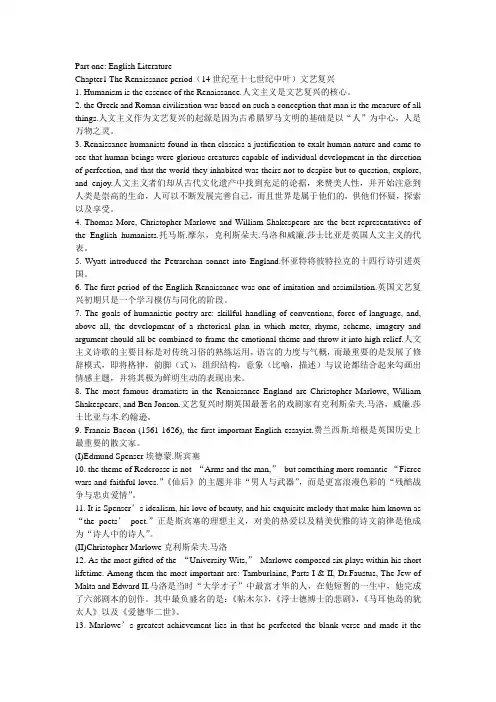
Part one: English LiteratureChapter1 The Renaissance period(14世纪至十七世纪中叶)文艺复兴1. Humanism is the essence of the Renaissance.人文主义是文艺复兴的核心。
2. the Greek and Roman civilization was based on such a conception that man is the measure of all things.人文主义作为文艺复兴的起源是因为古希腊罗马文明的基础是以“人”为中心,人是万物之灵。
3. Renaissance humanists found in then classics a justification to exalt human nature and came to see that human beings were glorious creatures capable of individual development in the direction of perfection, and that the world they inhabited was theirs not to despise but to question, explore, and enjoy.人文主义者们却从古代文化遗产中找到充足的论据,来赞美人性,并开始注意到人类是崇高的生命,人可以不断发展完善自己,而且世界是属于他们的,供他们怀疑,探索以及享受。
4. Thomas More, Christopher Marlowe and William Shakespeare are the best representatives of the English humanists.托马斯.摩尔,克利斯朵夫.马洛和威廉.莎士比亚是英国人文主义的代表。
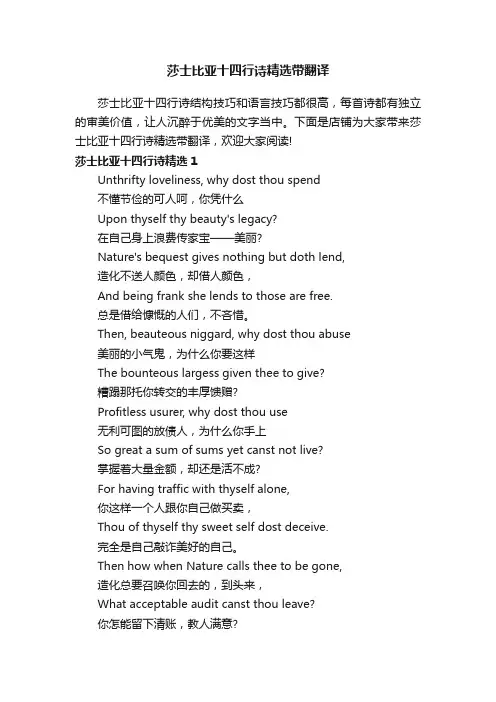
莎士比亚十四行诗精选带翻译莎士比亚十四行诗结构技巧和语言技巧都很高,每首诗都有独立的审美价值,让人沉醉于优美的文字当中。
下面是店铺为大家带来莎士比亚十四行诗精选带翻译,欢迎大家阅读!莎士比亚十四行诗精选1Unthrifty loveliness, why dost thou spend不懂节俭的可人呵,你凭什么Upon thyself thy beauty's legacy?在自己身上浪费传家宝——美丽?Nature's bequest gives nothing but doth lend,造化不送人颜色,却借人颜色,And being frank she lends to those are free.总是借给慷慨的人们,不吝惜。
Then, beauteous niggard, why dost thou abuse美丽的小气鬼,为什么你要这样The bounteous largess given thee to give?糟蹋那托你转交的丰厚馈赠?Profitless usurer, why dost thou use无利可图的放债人,为什么你手上So great a sum of sums yet canst not live?掌握着大量金额,却还是活不成?For having traffic with thyself alone,你这样一个人跟你自己做买卖,Thou of thyself thy sweet self dost deceive.完全是自己敲诈美好的自己。
Then how when Nature calls thee to be gone,造化总要召唤你回去的,到头来,What acceptable audit canst thou leave?你怎能留下清账,教人满意?Thy unused beauty must be tombed with thee,美,没有用过的,得陪你进坟墓,Which, used, lives th' executor to be.用了的,会活着来执行你的遗嘱。

莎士比亚经典十四行诗带翻译莎士比亚的十四行诗已令读者叹为观止,极大地影响了他那个时代甚至于如今的文人和文学爱好者,给人真、善、美的享受和心灵的启迪。
那么你想欣赏一下莎士比亚的经典十四行诗吗?下面是店铺为大家带来莎士比亚经典十四行诗带翻译,欢迎大家阅读!Ah! wherefore with infection should he live,唉,我的爱为什么要和臭腐同居,And with his presence grace impiety,把他的绰约的丰姿让人亵渎,That sin by him advantage should achieve以至罪恶得以和他结成伴侣,And lace itself with his society?涂上纯洁的外表来眩耀耳目?Why should false painting imitate his cheek骗人的脂粉为什么要替他写真,And steal dead seeing of his living hue?从他的奕奕神采偷取死形似?Why should poor beauty indirectly seek为什么,既然他是玫瑰花的真身,Roses of shadow, since his rose is true?可怜的美还要找玫瑰的影子?Why should he live, now Nature bankrupt is,为什么他得活着,当造化破了产,Beggar'd of blood to blush through lively veins?缺乏鲜血去灌注淡红的脉络?For she hath no excheckr now but his,因为造化现在只有他作富源,And, proud of many, lives upon his gains.自夸富有,却靠他的利润过活。
O, him she stores, to show what wealth she had 哦,她珍藏他,为使荒歉的今天In days long since, before these last so bad.认识从前曾有过怎样的丰年。
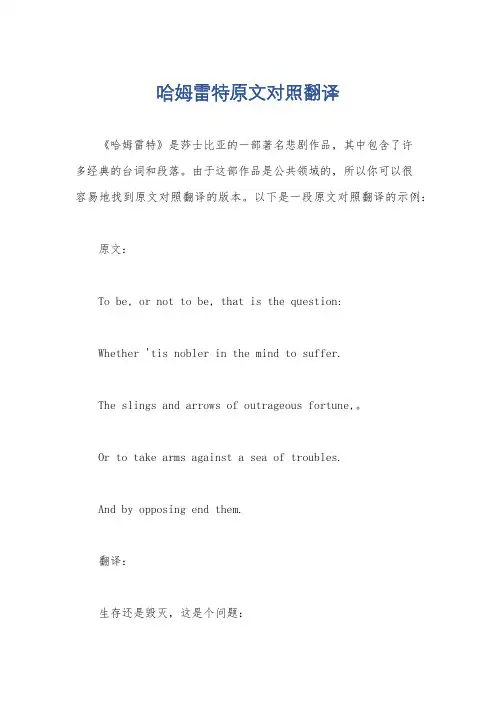
哈姆雷特原文对照翻译
《哈姆雷特》是莎士比亚的一部著名悲剧作品,其中包含了许
多经典的台词和段落。
由于这部作品是公共领域的,所以你可以很
容易地找到原文对照翻译的版本。
以下是一段原文对照翻译的示例:原文:
To be, or not to be, that is the question:
Whether 'tis nobler in the mind to suffer.
The slings and arrows of outrageous fortune,。
Or to take arms against a sea of troubles.
And by opposing end them.
翻译:
生存还是毁灭,这是个问题:
是心灵中忍受命运的弓箭。
还是反抗困难的大海。
通过反抗来结束它们。
这是《哈姆雷特》中著名的“生存还是毁灭”独白的一部分。
如果你需要更多原文对照翻译的内容,我建议你查阅相关的书籍或在网上搜索。
有许多学者和翻译家对《哈姆雷特》进行了精彩的翻译和解读,你可以找到适合你需求的版本。
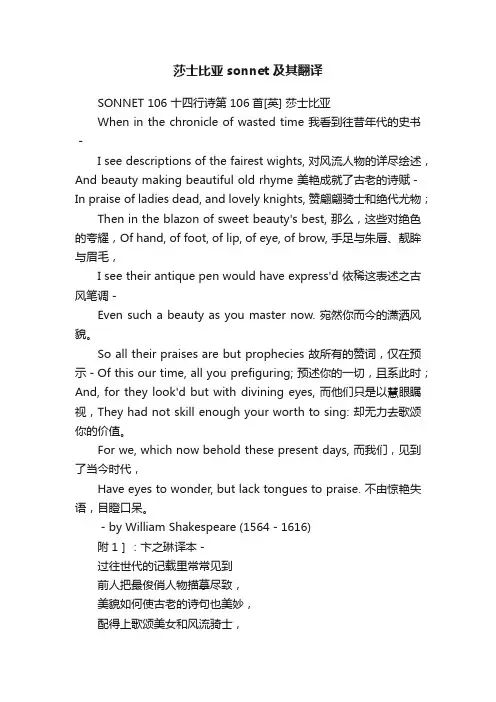
莎士比亚sonnet及其翻译SONNET 106 十四行诗第106首[英] 莎士比亚When in the chronicle of wasted time 我看到往昔年代的史书-I see descriptions of the fairest wights, 对风流人物的详尽绘述,And beauty making beautiful old rhyme 美艳成就了古老的诗赋-In praise of ladies dead, and lovely knights, 赞翩翩骑士和绝代尤物;Then in the blazon of sweet beauty's best, 那么,这些对绝色的夸耀,Of hand, of foot, of lip, of eye, of brow, 手足与朱唇、靓眸与眉毛,I see their antique pen would have express'd 依稀这表述之古风笔调-Even such a beauty as you master now. 宛然你而今的潇洒风貌。
So all their praises are but prophecies 故所有的赞词,仅在预示-Of this our time, all you prefiguring; 预述你的一切,且系此时;And, for they look'd but with divining eyes, 而他们只是以慧眼瞩视,They had not skill enough your worth to sing: 却无力去歌颂你的价值。
For we, which now behold these present days, 而我们,见到了当今时代,Have eyes to wonder, but lack tongues to praise. 不由惊艳失语,目瞪口呆。
-by William Shakespeare (1564-1616)附1]:卞之琳译本-过往世代的记载里常常见到前人把最俊俏人物描摹尽致,美貌如何使古老的诗句也美妙,配得上歌颂美女和风流骑士,看人家夸赞美貌是怎样的无比,什么手,什么脚,什么嘴,什么眼,什么眉,我总是看出来他们古雅的手笔差不多恰好表现了你的秀美。
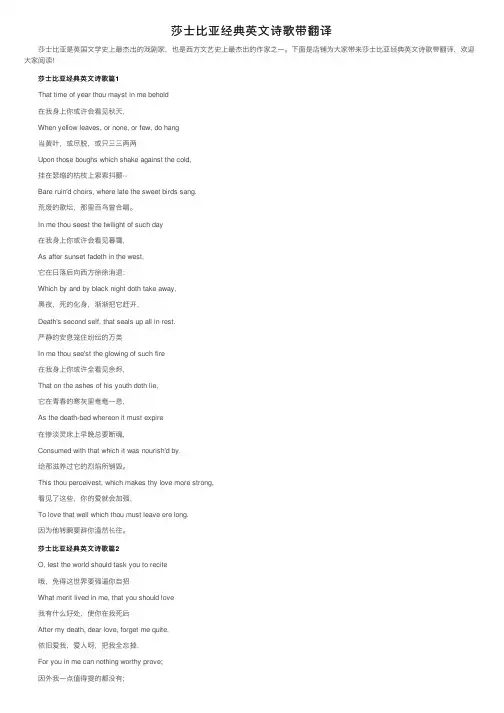
莎⼠⽐亚经典英⽂诗歌带翻译 莎⼠⽐亚是英国⽂学史上最杰出的戏剧家,也是西⽅⽂艺史上最杰出的作家之⼀。
下⾯是店铺为⼤家带来莎⼠⽐亚经典英⽂诗歌带翻译,欢迎⼤家阅读! 莎⼠⽐亚经典英⽂诗歌篇1 That time of year thou mayst in me behold 在我⾝上你或许会看见秋天, When yellow leaves, or none, or few, do hang 当黄叶,或尽脱,或只三三两两 Upon those boughs which shake against the cold, 挂在瑟缩的枯枝上索索抖颤-- Bare ruin'd choirs, where late the sweet birds sang. 荒废的歌坛,那⾥百鸟曾合唱。
In me thou seest the twilight of such day 在我⾝上你或许会看见暮霭, As after sunset fadeth in the west, 它在⽇落后向西⽅徐徐消退: Which by and by black night doth take away, ⿊夜,死的化⾝,渐渐把它赶开, Death's second self, that seals up all in rest. 严静的安息笼住纷纭的万类 In me thou see'st the glowing of such fire 在我⾝上你或许全看见余烬, That on the ashes of his youth doth lie, 它在青春的寒灰⾥奄奄⼀息, As the death-bed whereon it must expire 在惨淡灵床上早晚总要断魂, Consumed with that which it was nourish'd by. 给那滋养过它的烈焰所销毁。
This thou perceivest, which makes thy love more strong, 看见了这些,你的爱就会加强, To love that well which thou must leave ere long. 因为他转瞬要辞你溘然长往。
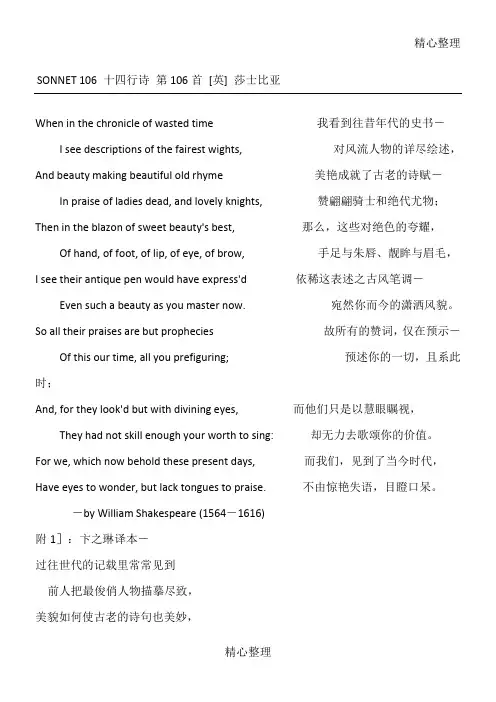
精心整理SONNET 106 十四行诗第106首[英] 莎士比亚
When in the chronicle of wasted time 我看到往昔年代的史书-
I see descriptions of the fairest wights, 对风流人物的详尽绘述,And beauty making beautiful old rhyme 美艳成就了古老的诗赋-
时;
-by William Shakespeare (1564-1616)
附1]:卞之琳译本-
过往世代的记载里常常见到
前人把最俊俏人物描摹尽致,
美貌如何使古老的诗句也美妙,
配得上歌颂美女和风流骑士,
看人家夸赞美貌是怎样的无比,
什么手,什么脚,什么嘴,什么眼,什么眉,我总是看出来他们古雅的手笔
差不多恰好表现了你的秀美。
[附
于是我发现古代的文笔早就
表达出来了你今天具有的美貌。
那么,古人的赞辞都只是预言—
预言了我们这时代:你的仪态;
但古人只能用预想的眼睛测看,
还不能充分歌唱出你的价值来:至于我们呢,看见了今天的景象,有眼睛惊讶,却没有舌头会颂扬。
[附7]:铁冰译本-
我从远古时代的历史记载里
在时间的无涯记事里,
绝代芳华被前人描尽,
天姿使古老诗句韵起,
颂扬远逝的佳人武衿;
生花妙笔成就美俊,
纤手玉足唇小眉眼清,古笔朴拙墨香传神韵,美人如伊小立黯繁星;华章丽藻携佳句天成,穿越时空描摹你容颜,。
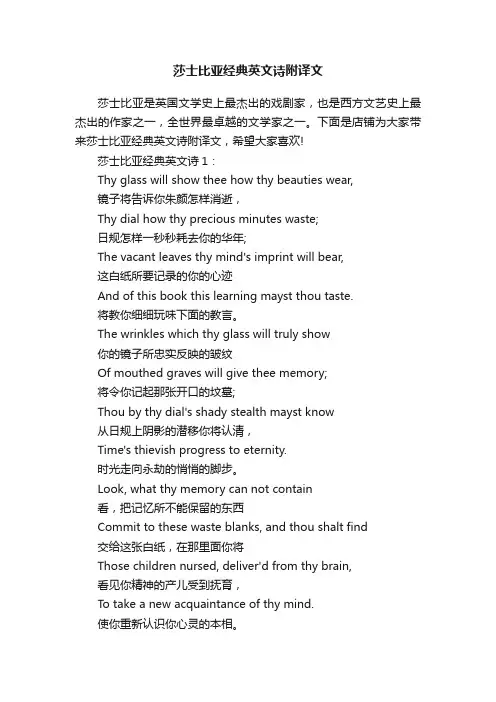
莎士比亚经典英文诗附译文莎士比亚是英国文学史上最杰出的戏剧家,也是西方文艺史上最杰出的作家之一,全世界最卓越的文学家之一。
下面是店铺为大家带来莎士比亚经典英文诗附译文,希望大家喜欢!莎士比亚经典英文诗1:Thy glass will show thee how thy beauties wear,镜子将告诉你朱颜怎样消逝,Thy dial how thy precious minutes waste;日规怎样一秒秒耗去你的华年;The vacant leaves thy mind's imprint will bear,这白纸所要记录的你的心迹And of this book this learning mayst thou taste.将教你细细玩味下面的教言。
The wrinkles which thy glass will truly show你的镜子所忠实反映的皱纹Of mouthed graves will give thee memory;将令你记起那张开口的坟墓;Thou by thy dial's shady stealth mayst know从日规上阴影的潜移你将认清,Time's thievish progress to eternity.时光走向永劫的悄悄的脚步。
Look, what thy memory can not contain看,把记忆所不能保留的东西Commit to these waste blanks, and thou shalt find交给这张白纸,在那里面你将Those children nursed, deliver'd from thy brain,看见你精神的产儿受到抚育,To take a new acquaintance of thy mind.使你重新认识你心灵的本相。
These offices, so oft as thou wilt look,这些日课,只要你常拿来重温,Shall profit thee and much enrich thy book.将有利于你,并丰富你的书本。
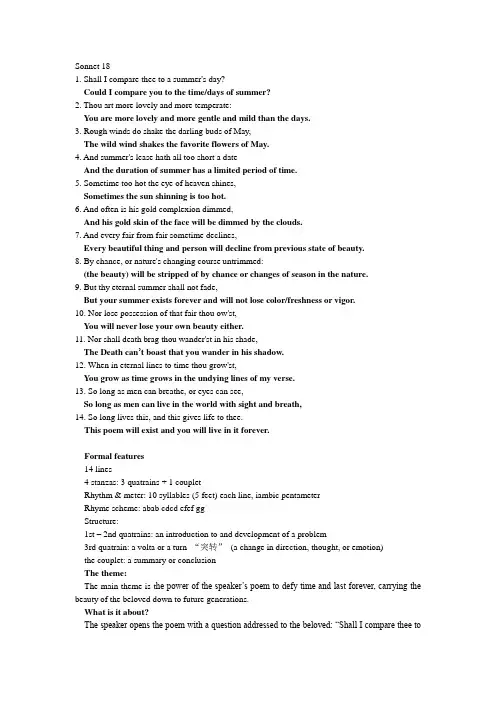
Sonnet 181. Shall I compare thee to a summer's day?Could I compare you to the time/days of summer?2. Thou art more lovely and more temperate:You are more lovely and more gentle and mild than the days.3. Rough winds do shake the darling buds of May,The wild wind shakes the favorite flowers of May.4. And summer's lease hath all too short a dateAnd the duration of summer has a limited period of time.5. Sometime too hot the eye of heaven shines,Sometimes the sun shinning is too hot.6. And often is his gold complexion dimmed,And his gold skin of the face will be dimmed by the clouds.7. And every fair from fair sometime declines,Every beautiful thing and person will decline from previous state of beauty.8. By chance, or nature's changing course untrimmed:(the beauty) will be stripped of by chance or changes of season in the nature.9. But thy eternal summer shall not fade,But your summer exists forever and will not lose color/freshness or vigor.10. Nor lose possession of that fair thou ow'st,You will never lose your own beauty either.11. Nor shall death brag thou wander'st in his shade,The Death can’t boast that you wander in his shadow.12. When in eternal lines to time thou grow'st,You grow as time grows in the undying lines of my verse.13. So long as men can breathe, or eyes can see,So long as men can live in the world with sight and breath,14. So long lives this, and this gives life to thee.This poem will exist and you will live in it forever.Formal features14 lines4 stanzas: 3 quatrains + 1 coupletRhythm & meter: 10 syllables (5 feet) each line, iambic pentameterRhyme scheme: abab cdcd efef ggStructure:1st – 2nd quatrains: an introduction to and development of a problem3rd quatrain: a volta or a turn “突转”(a change in direction, thought, or emotion)the couplet: a summary or conclusionThe theme:The main theme is t he power of the speaker’s poem to defy time and last forever, carrying the beauty of the beloved down to future generations.What is it about?The speaker opens the poem with a question addressed to the beloved: “Shall I compare thee toa summer’s day?” The next eleven lines are devoted to such a comparison. Summer: (Line 3: rough winds;4:too short;5. too hot;6. too dimmed;7&8. beautiful things will die) Sonnet 18 is the first poem in the sonnets not to explicitly encourage the young man to have children. The “procreation” sequence of the first 17 sonnets ended with the speaker’s realization that the young man might not need children to preserve his beauty; he could also live forever in this poem.Figures of speechIn line (5 ) There is a Metaphor .In line ( 5+6 ) There is a Personification .( eye of Heaven shines ) : Eye of heaven = the sunThe sun became dark because dark of clouds .In Line (9+10+12 ) There is a Hyperbole .In Line ( 11 )There is a personification .In Line ( 14 ) There is an Inverted order .Analysis: (拓展)The poem works at a rather curious level of achieving its objective through dispraise.The summer's day is found to be lacking in so many respects (too short, too hot, too rough, and sometimes too dingy), but curiously enough one is left with the abiding impression that 'the lovely boy' is in fact like a summer's day at its best, fair, warm, sunny, temperate, one of the darling buds of May, and that all his beauty has been wonderfully highlighted by the comparison.Sonnet 1301. My mistress' eyes are nothing like the sun;My lady’s eyes aren’t like the sun at all.2. Coral is far more red, than her lips red:Coral is much redder than her lips.3. If snow be white, why then her breasts are dun;If snow is white, then her breasts are brown.4. If hairs be wires, black wires grow on her head.If hair is as coarse as threads, then her hair is full of black threads.5. I have seen roses damasked, red and white,I have seen the pinkish, red and white roses.6. But no such roses see I in her cheeks;But I can see such kinds of roses in her cheeks.7. And in some perfumes is there more delightThere is much tempting/attractive fragrance.8. Than in the breath that from my mistress reeks.The fragrance is more attractive than her steamy, sweaty and unsavory smells.9. I love to hear her speak, yet well I knowI like listening to her speaking, but I am also aware that10. That music hath a far more pleasing sound:The sound of music is much more favorable than her sound.11. I grant I never saw a goddess go,I admit that I never saw a goddess walking by.12. My mistress, when she walks, treads on the ground:My mistress stamps on the floor when she walks.13. And yet by heaven, I think my love as rare,But I can swear to God that my lover is as precious as15. As any she belied with false compare.As any woman who has been misrepresented by ridiculous comparisons.Formal features14 lines4 stanzas: 3 quatrains + 1 coupletRhythm & meter: 10 syllables (5 feet) each line, iambic pentameterRhyme scheme: abab cdcd efef ggStructure:1st – 2nd quatrains: an introduction to and development of a problem3rd quatrain: a volta or a turn “突转”(a change in direction, thought, or emotion)the couplet: a summary or conclusionThemeThe poet suggests their love is rare because he does not desire her to be something she is not.It's about finding love in spite of (or maybe even because of) physical flaws.It pokes fun at our obsession with looks and to show how ridiculous it is to ask any person to live up to some ideal of perfect beauty.Figures of speechNegative similesSimile may also be expressed in the negative form“My mistress’ eyes are nothing like the sun”Etc.Ironic toneThe sonnet appears to be humorous, but the couplet displays the deeply romantic tone of the poem.Analysis(拓展)In many ways, Shakespeare’s sonnets subvert and reverse the conventions of the Petrarchan love sequence: the idealizing love poems, for instance, are written not to a perfect woman but to an admittedly imperfect man, and the love poems to the dark lady are anything but idealizing, like this one. He describes the woman that he loves in extremely unflattering terms but claims that he truly loves her, which lends credibility to his claim because even though he does not find her attractive, he still declares his love for her.Sonnet 1291. The expense of spirit in a waste of shameThe expenditure of sexual energy in a desert of shameful moral decay2. Is lust in action: and till action, lustIs the lust/letch acting: and before having sexual intercourse, lust3. Is perjured, murderous, bloody, full of blame,Is dishonest, murderous, violent and blameworthy with a lot of guilt.4. Savage, extreme, rude, cruel, not to trust;Barbaric, extreme, rude, cruel, and untrustworthy.5. Enjoyed no sooner but despised straight;As soon as lust has been enjoyed, it is hated.6. Past reason hunted; and no sooner had,Lust is pursued beyond the control of reason, as soon as lust is fulfilled,7. Past reason hated, as a swallowed bait,It is hated irrationally like a bait that a fish swallows8. On purpose laid to make the taker mad.(The bait) set on purpose to make the trapped creature react with frenzy.9. Mad in pursuit and in possession so;10. Had, having, and in quest to have extreme;The taker is insane in pursuing one's lust and mad in possessing the object of lust: going to extremes in having had it, in the having of it, and in seeking to have it;11. A bliss in proof, and proved, a very woe;A heavenly sensation while it is being experienced. Once you are done, it is a true sorrow.12. Before, a joy proposed; behind a dream.An expected joy exists before having it; after having it, it seems like a dream.13. All this the world well knows; yet none knows wellEveryone in the world knows it very well, but no one knows14. To shun the heaven that leads men to this hell.To avoid the tempting sense of delight which leads men to hell.Formal features14 lines4 stanzas: 3 quatrains + 1 coupletRhythm & meter: 10 syllables (5 feet) each line, iambic pentameterRhyme scheme: abab cdcd efef ggStructure:1st – 2nd quatrains: an introduction to and development of a problem3rd quatrain: a volta or a turn “突转”(a change in direction, thought, or emotion)the couplet: a summary or conclusionTheme•About lust.–Lines 1-2: lust in action (shameful and wasteful...)–Lines 3-4: lust before action (dishonest, murderous, bloody…)–Lines 5-8: a comparison between lust before and after action (enjoyed vs.despised; both are past-reason / mad) – lust causes madness!–Lines 9-12: a comparison between lust before and after action. (bliss vs. woe;joy vs. dream) – lust causes sadness and disillusionment.–Lines 13-14: a conclusion.Figures of speech•Simile: taker of lust as a hooked fish•Personification: lust as a person•Contrasts: "before" vs. "behind" (after), "heaven" vs. "hell," and so on.Analysis (拓展)•The profound hatred of sexuality, sexual pessimism•Its hatred of sexuality derives from the Christian imperative of the virginal life and the dislike of all bodily functions•It gives essentially a phallo-centric view of sex•Impersonal tone: The speaker never says outright that he is writing about his own experience; instead, he presents the poem as an impersonal description, a catalogue of the kinds of experience offered by lust.。
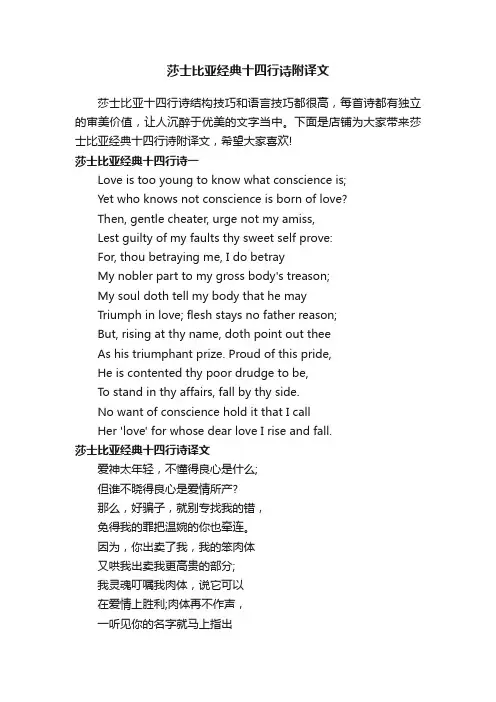
莎士比亚经典十四行诗附译文莎士比亚十四行诗结构技巧和语言技巧都很高,每首诗都有独立的审美价值,让人沉醉于优美的文字当中。
下面是店铺为大家带来莎士比亚经典十四行诗附译文,希望大家喜欢!莎士比亚经典十四行诗一Love is too young to know what conscience is;Yet who knows not conscience is born of love?Then, gentle cheater, urge not my amiss,Lest guilty of my faults thy sweet self prove:For, thou betraying me, I do betrayMy nobler part to my gross body's treason;My soul doth tell my body that he mayTriumph in love; flesh stays no father reason;But, rising at thy name, doth point out theeAs his triumphant prize. Proud of this pride,He is contented thy poor drudge to be,To stand in thy affairs, fall by thy side.No want of conscience hold it that I callHer 'love' for whose dear love I rise and fall.莎士比亚经典十四行诗译文爱神太年轻,不懂得良心是什么;但谁不晓得良心是爱情所产?那么,好骗子,就别专找我的错,免得我的罪把温婉的你也牵连。
因为,你出卖了我,我的笨肉体又哄我出卖我更高贵的部分;我灵魂叮嘱我肉体,说它可以在爱情上胜利;肉体再不作声,一听见你的名字就马上指出你是它的胜利品;它趾高气扬,死心蹋地作你最鄙贱的家奴,任你颐指气使,或倒在你身旁。
英美文学选读翻译(英语专业自考)第一部分:英国文学第五章现代时期19世纪末到20世纪初,欧洲的自然科学与社会科学都有长足的发展,物质财富大量增加。
当自由资本主义进入垄断型经济时期,社会化大生产与生产资料私有制之间的矛盾便愈发激化,导致接连不断的经济危机与大范围失业,贫富分化走向极端。
由此引发的第一次世界大战削弱了大英帝国,使人民倍受其苦。
战后的经济萧条与精神失落使人民看清了资本主义背后的罪恶面孔。
而第二次世界大战更大幅度地摧垮了大英帝国,人民伤亡,经济倒退,殖民地在民族解放运动中也纷纷独立。
日不落帝国终于日薄西山了。
这一系列巨变在西欧产生了百花争放般的各家哲学思想。
19世纪中期,马克思、恩格斯开创了科学社会主义,为斗争中的无产资级指明了道路。
达尔文的进化论打击了人们的宗教信仰,"适者生存"说很大程度上推进了殖民主义与沙文主义。
爱因斯坦的相对论也完全更新了时间与空间的概念。
弗洛依德的精神分析法改变了人们对人性的认识。
德国哲学家亚瑟·叔本华的悲观主义与反理性哲学强调了人的意愿与直觉的重要性。
继承了叔本华的理论后,尼采更进一步地反叛理性主义与基督教精神,推崇强权与霸权。
亨利·伯格森在前人基础上创立了非理性哲学,强调创造力、直觉、非理性与无意识。
这些非理性哲学对英国现代派作家影响极为深远。
现代主义起源于怀疑论和对资本主义的幻想破灭。
一次大战的毁灭性灾难摧垮了人们对维多利亚道德标准的信奉。
新兴的非理性哲学与科技进步促使作家们对人性与人际关系进行新的探'索。
19世纪晚期法国的象征主义预示了现代主义的诞生。
一次大战后,所有的现代主义文学潮流都产生了:表现主义(强调自我表现,反对艺术的目的性)、超现实主义、未来主义、达达主义(颓废派文艺〉、意象主义以及意识流等等。
到二十世纪二十年代,这些潮流汇聚成一场浩大的现代主义变革运动,席卷了整个欧美。
这场运动中的杰出人物有卡夫卡、毕加索、庞德、韦伯恩,T·S·埃略特、乔依斯及弗洛尼亚·沃尔夫。
莎翁优美英文诗歌带翻译莎士比亚十四行诗结构技巧和语言技巧都很高,每首诗都有独立的审美价值,让人沉醉于优美的文字当中。
下面是店铺为大家带来莎翁优美英文诗歌带翻译,欢迎大家阅读欣赏!莎翁优美英文诗歌1As fast as thou shalt wane, so fast thou grow'st你衰败得快,但你将同样迅捷In one of thine, from that which thou departest;在你出生的孩子身上生长;And that fresh blood which youngly thou bestow'st你趁年轻时灌注的新鲜血液,Thou mayst call thine, when thou from youth convertest.依然是属于你的,不怕你衰亡。
Herein lives wisdom, beauty, and increase;这里存在着智慧,美,繁滋;Without this, folly, age, and cold decay.否则是愚笨,衰老,寒冷的腐朽:If all were minded so, the times should cease,如果大家不这样,时代会停止,And threescore year would make the world away.把世界结束也只消六十个年头。
Let those whom Nature hath not made for store,有些东西,造化不准备保留,Harsh, featureless, and rude, barrenly perish.尽可以丑陋粗糙,没果实就死掉:Look whom she best endowed, she gave the more;谁得天独厚,她让你更胜一筹;Which bounteous gift thou shouldst in bounty cherish.你就该抚育那恩赐,把它保存好;She carved thee for her seal, and meant thereby造化刻你做她的图章,只希望Thou shouldst print more, not let that copy die.你多留印鉴,也不让原印消亡。
十四行诗原文及翻译莎士比亚《十四行诗》原文:When I do count the clock that tells the time,And see the brave day sunk in hideous night;When I behold the violet past prime,And sable curls all silver'd o'er with white.When lofty trees I see barren of leaves,Which erst from heat did canopy the herd,And summer's green, all girded up in sheaves,Born on the bier with white and bristly beard.Then of thy beauty do I question make,That thou among the wastes of time must go,Since sweets and beauties do themselves forsake,And die as fast as they see others grow.And nothing 'gainst Time's scythe can make defence,Save breed, to brave him when he takes thee hence.翻译参考:我数着报时的钟声,看着大好的白昼陷入夜晚;我看到紫罗兰开过了全盛,一层银白罩上了貂黑的发鬈;我看见曾为牧群遮荫的高树,如今树叶已经完全脱光,夏季的绿苗都紧紧捆扎成束,带着白硬芒须被抬了去埋葬;于是对于斧美貌我就开始担心,恐怕你要随着时间而被淘汰,因为美妙的事物总要蠲弃自身,很快的死去,看着别个生长起来; 时间的镰刀没人能够阻挡,除非是你被抓走,让孩子去抵抗。
莎士比亚经典十四行诗附译文莎士比亚十四行诗结构技巧和语言技巧都很高,每首诗都有独立的审美价值,让人沉醉于优美的文字当中。
下面是店铺为大家带来莎士比亚经典十四行诗附译文,希望大家喜欢!莎士比亚经典十四行诗一Love is too young to know what conscience is;Yet who knows not conscience is born of love?Then, gentle cheater, urge not my amiss,Lest guilty of my faults thy sweet self prove:For, thou betraying me, I do betrayMy nobler part to my gross body's treason;My soul doth tell my body that he mayTriumph in love; flesh stays no father reason;But, rising at thy name, doth point out theeAs his triumphant prize. Proud of this pride,He is contented thy poor drudge to be,To stand in thy affairs, fall by thy side.No want of conscience hold it that I callHer 'love' for whose dear love I rise and fall.莎士比亚经典十四行诗译文爱神太年轻,不懂得良心是什么;但谁不晓得良心是爱情所产?那么,好骗子,就别专找我的错,免得我的罪把温婉的你也牵连。
因为,你出卖了我,我的笨肉体又哄我出卖我更高贵的部分;我灵魂叮嘱我肉体,说它可以在爱情上胜利;肉体再不作声,一听见你的名字就马上指出你是它的胜利品;它趾高气扬,死心蹋地作你最鄙贱的家奴,任你颐指气使,或倒在你身旁。
莎士比亚经典十四行诗译文莎士比亚是英国文学史上最杰出的戏剧家,也是西方文艺史上最杰出的作家之一,全世界最卓越的文学家之一。
下面是店铺为大家带来莎士比亚经典十四行诗译文,欢迎大家阅读!莎士比亚经典十四行诗译文1:No longer mourn for me when I am dead我死去的时候别再为我悲哀,Then you shall hear the surly sullen bell当你听见那沉重凄惨的葬钟Give warning to the world that I am fled普告给全世界说我已经离开From this vile world, with vilest worms to dwell:这龌龊世界去伴最龌龊的虫:Nay, if you read this line, remember not不呀,当你读到这诗,别再记起The hand that writ it; for I love you so那写它的手;因为我爱到这样,That I in your sweet thoughts would be forgot宁愿被遗忘在你甜蜜的心里,If thinking on me then should make you woe.如果想起我会使你不胜哀伤。
O, if, I say, you look upon this verse如果呀,我说,如果你看见这诗,When I perhaps compounded am with clay,那时候或许我已经化作泥土,Do not so much as my poor name rehearse.连我这可怜的名字也别提起,But let your love even with my life decay,但愿你的爱与我的生命同腐。
Lest the wise world should look into your moan 免得这聪明世界猜透你的心,And mock you with me after I am gone.在我死去后把你也当作笑柄。
英文原著莎士比亚作文翻译英文:As someone who has read Shakespeare's original works in English, I can attest to the beauty and complexity of his writing. His plays and sonnets are filled with rich language, intricate plots, and nuanced characters that have stood the test of time.One of my favorite works by Shakespeare is "Hamlet." The play's exploration of revenge, madness, and mortalityis both haunting and thought-provoking. The character of Hamlet himself is one of the most complex and fascinatingin all of literature, with his internal struggles and conflicting emotions.Another aspect of Shakespeare's writing that I appreciate is his use of language. His plays are filled with poetic language, clever wordplay, and memorable quotes that have become part of the English language. For example,phrases like "to be or not to be" and "all the world's a stage" are instantly recognizable and have been referencedin countless works of literature and pop culture.Overall, reading Shakespeare's original works inEnglish is a rewarding experience that allows you to fully appreciate the beauty and complexity of his writing.中文:作为一个读过莎士比亚原著的人,我可以证明他的写作之美和复杂度。
威廉-莎士比亚威廉-莎士比亚(1564-1616)是世界有史以来最著名的作剧家和诗人之一。
凭着38部作品,154首十四行诗和2首长诗,他建立了他在世界文学史中的赫赫威名。
他也被全世界各式各样的学者和评论家给予了最高的赞誉。
在过去4百年间,关于莎士比亚的书籍和文章还不断大量出版。
莎士比亚可能出生于1564年4月23日埃文河畔斯特拉特福城的一户商人家庭。
他的父亲的职业被传为是卖手套的、羊毛商人、农夫或者是屠夫,是一个镇上有点地位的人,并多次当选为镇委员会的成员。
莎士比亚在哪个美丽的贸易小镇度过了他的童年并上了斯特拉特福语文小学。
他真正的老师是大自然和周围的百姓。
1587年,莎士比亚娶了大他几岁的安妮-哈撒韦为妻。
妻子为他生了3个孩子,苏珊娜和双胞胎朱迪斯和哈姆尼特。
也许由于要养活不断壮大的家庭,莎士比亚在1586或1587年离开斯特拉特福去了伦敦。
莎士比亚去了伦敦一处为戏剧发展提供了优越环境的地方。
他既当演员又做作剧家,为张伯伦家族做事,张伯伦家族后来又成为了王族。
莎士比亚的事业发展得如此的好以致被誉为‘大学才子’之一的罗伯特-格林气极败坏地地称呼他是只‘向上扑腾的乌鸦’。
大约从1591到1611年间,莎士比亚到达了他戏剧生涯的顶峰,他的作品一部又一部地不断问世。
莎士比亚没有把他的天赋局限于戏院里,在1593和1954年,他发表了2篇叙事诗,《维纳斯与阿多尼斯》和《路易斯受辱记》,都是写给南安普顿伯爵的。
1609年他也写了短诗并出版了。
到1597年时莎士比亚已经很有钱了,他在斯特拉特福买套大宅子作为新居。
大约于1610年莎士比亚从伦敦退隐回了斯特拉特福,即便如此他还是坚持写作了一段时间。
他卒于1616年4月23日。
由于对莎士比亚的许多作品的创作准确时间仍然存有争议,评论家们对把莎士比亚戏生涯的戏剧作品划分阶段方面存有不同的观点。
但总体来说他的戏剧生涯可以分为4个时期。
莎士比亚戏剧创作生涯的第一个阶段是创作早期。
他写了5部历史剧:《亨利六世》的第一、二、三部,和《泰特斯·安特洛尼克斯》;4部戏剧:《错误的戏剧》,《维罗纳的2位绅士》,《驯悍记》和《爱的徒劳》。
第二个阶段,莎士比亚的创作风格和方式变得极具个性。
在不同的人物之间、现象和现实之间,莎士比亚构造了复杂的典范,他对人类各种缺点进行了精妙的诠释。
在这个时期他写了5部历史剧:《理查二世》,《约翰国王》,《亨利四世》第一、二部和《亨利五世》;6部戏剧:《仲夏夜之梦》,《威尼斯的商人》,《无事生非》,《皆大欢喜》,《第12夜》和《温莎的风流妇人》;2部悲剧:《罗密欧和朱丽叶》和《裘里斯凯撒》莎士比亚的第三时期作品包括他最杰出的悲剧和所谓的黑色喜剧。
这个时期的悲剧有:《哈姆雷特》,《奥赛罗》,《李尔王》,《麦克白》,《安东尼与克利奥帕特拉》,《特洛伊罗斯与克雷西达》和《科里奥兰纳斯》。
2部喜剧是:《终成眷属》和《争锋相对》。
莎士比亚最后时期的作品包括他主要的烂漫悲喜剧:《伯利克里》,《辛白林》,《冬天的故事》和《暴风雨》;和他最后两部作品:《亨利八世》和《两个贵亲戚》。
莎士比亚真正的跟戏剧五官的是个主要是两首叙述长诗:《维纳斯和阿多尼斯》和《路易斯受辱记》,和他的154首系列短诗。
莎士比亚的十四行诗都单是直接对诗人感情的直接表达。
这些十四行诗中,1至126首都是写给一位敬重他、相貌出众、地位显赫但在品行和坚贞有瑕疵的年轻人的。
127-152号跟其它诗有点不相干,讲了作者的一个情妇,一个既淫乱,又有着不可抗拒的魅力的神秘的“黑色夫人”。
最后两首十四行诗显然不是写给朋友和情妇的,它们是对古希腊讽喻短诗的译文或改编,都是专门说巴斯温泉的。
另外三首莎士比亚是用斯瑞发明出来的英国流行格式,即三节四行诗加一节偶句。
虽然莎士比亚很少采用的,但这种修辞组织方式还是给使用了。
偶句通常把十四行诗接到一个一般主题系列里,把四行诗解放出来焕发出那些明显不同于十四行诗诗歌激情。
莎士比亚的历史剧都是这样一个主题,在一个强大而英明的君主统领下的国家,统一是非常必要的。
《亨利六世》统治下的三部历史剧是莎士比亚英史史诗性的描绘的开端。
《亨利六世》的第一二部毫无疑问是莎士比亚历史剧中最多人阅读的。
它揭露了15世纪糟糕的统治。
莎士比亚介绍了当英国被法国占领那种悲伤下的爱国精神。
他也写在杰克-盖得于1450年崛起期间统治和被统治之间的阶级斗争。
更进一步,他谴责了由封建贵族发动的玫瑰战争而导致无辜百姓伤亡的行为。
此时,莎士比亚再不模仿任何同时代的先例。
此外,在热刺和哈尔王子之间、哈尔王子和他父亲亨利四世之间有一种很精彩的人与人间的权衡。
莎士比亚在他的烂漫喜剧中提倡的是用乐观态度去获得爱情和年轻,而烂漫元素被灌输到全剧当中。
在所有喜剧中最重要的一部是《威尼斯商人》,莎士比亚在其中创造了立刻能使人脑力刺激、情感集中的紧张、彷徨和自娱自乐型的诡计。
这种诡辩部分来自剧中高度外扬的烂漫和负面憎恨的黑暗势力之间的对抗。
剧中传统的主题是赞扬安东尼奥和巴萨尼奥之间的友谊,把波西亚塑造成一位美丽、智慧、忠贞的女英雄,揭发犹太人的贪得无厌和残忍。
但经过几百年对犹太人的虐待,特别是二战时期德国纳粹对犹太人的大屠杀,现在已经不会再把他们这些唯利是图的家伙当做一贯的邪恶人群了。
今日许多人把这部戏看做是对基督教徒的伪善、对待友谊和爱情的虚假、追求世俗利益的狡诈方式和不公正对犹太人的偏见的一种讽刺。
在跟其它剧本的对比之下,《威尼斯的商人》在对人性和人类冲突的现实方面更是向前迈进了一步。
莎士比亚早期的文化复兴精神的快乐充分体现在和中世纪对未来生活的特点对比中。
很成功的烂漫悲剧是《罗密欧和朱丽叶》,它赞扬了对爱情的忠贞和追求幸福的精神。
这部剧虽是不悲剧却弥漫着一股乐观的精神。
莎士比亚最伟大的悲剧是:《哈姆雷特》,《奥赛罗》,《李尔王》和《麦克白》。
它们都有些共同的特征。
每部戏都描述了一些面对生活中不平事、陷入困境高贵的英雄,他们的命运往往和整个国家的命运连接在一起。
每个英雄都有着人性缺点:哈姆雷特,一位压抑的书生王子,面临行动和思想冲突进退两难的抉择。
奥赛罗的内在缺点是外部邪恶力量对他的影响。
老李尔王是不想完全放下手中的权利从而受到背叛和不贞的煎熬。
麦克白对权利的欲望搅乱了他的抱负并让他进行连续的作恶。
在重点描写悲惨的英雄下,莎士比亚围绕他们编写了整个世界。
在对英雄的缺点或偏见的描述下,我们看到了再个人主义和社会邪恶势力之间的尖锐斗争,它们体现了莎士比亚在真实世界中是位伟大的现实主义者。
所有悲剧中《哈姆雷特》是排首位的,它一般被认为是莎士比亚在舞台上最受欢迎的戏剧,它有恐怖的凶杀情节和在生死间的哲理探索。
这部剧可能写于1601年,是以一位北欧的广为人知的传奇人物为原型编剧的。
莎士比亚采用一个‘复仇悲剧’式的大概轮廓(基德在其它作品中也用过),但他加了远远比原来更精彩的情节。
这本强大的剧本发出永恒的呼唤是它囊括了阴谋、情感冲突和对哲学忧郁的探索情节。
剧本是以丹麦王子哈姆雷特开演的,忧郁父亲近期的逝世和他母亲草率改嫁给他叔叔克劳迪亚斯使他露出一种厌世情绪。
当他遇到父亲鬼魂时,他被告知克劳迪亚斯谋杀了他父亲并夺了其王位和女人。
因此,哈姆雷特被鬼魂催促去为他父亲复仇,因为他被施以最无人性的邪恶谋杀。
但刚想复仇的哈姆雷特没有任何的血腥杀戮念想。
并不是因为他没有行动能力,而是因为他的思想瞻前顾后,行动起来顾虑重重,当机会最后到来之时,英雄的气势不但没增强反而减弱,挫败了。
陷入一个充满侦查、检测和密谋的噩梦,明显地在忍受担上着为父亲死亡复仇的难以忍受的重担,哈姆雷特生活在一个阴暗的世界,生活在现实和虚幻、言语和行动之中。
他的生活就是一连串的角色扮演,检查每次活动的性质害怕有突发事件,由于太世故他不可能将自己降格到传统中的一个单纯的复仇者。
对于这样一个人物,自言自语是必不可少减除痛苦的自然媒介。
独白从上下文背景中独立出来几百年了,而哈姆雷特的一些带质疑的独白具有超越权利和洞察力的能力。
但我们的兴趣并不局限于哈姆雷特这个悲惨的英雄,也因为这部戏剧也是莎士比亚揭发一个堕落的宫廷描述得最详尽的——一个未除草、什么都没有只有一团邪恶和致命的水汽的花园。
在揭露权利争夺,排挤同僚,不可告人的动机和掩饰在彬彬有礼和表面下的欲望和犯罪之下,莎士比亚谴责了皇宫里的伪善、反叛和普遍的腐败。
在莎士比亚最后时期的戏剧中,流行一套人神调和的教条。
莎士比亚像是进入到了一个想象中的牧师世界。
因此他可以取得一些在现实世界中得不到的东西。
例如去纠正错误和实现理想等。
《暴风雨》作为他最后烂漫故事里最佳的一部,是一个详细描写而又虚幻的故事。
人物都相当具有讽刺意味,情节又充满联想。
人类世界里不可能的事情在剧中到处都有发生。
狂野风暴变得有魔力了,回应着普洛斯彼罗每个指示。
编剧者凭借超自然的环境解决了矛盾。
莎士比亚一生中不单单只有一个梦想。
因此,《暴风雨》成为他晚年中对人类生命和社会的一个典型的悲观看法代表。
作为当时人文主义者的莎士比亚,被引发了内战的宫廷内发生的封建暴政、分裂和争权的内部斗争所震撼。
在剧中他毫不犹豫地描绘了内战中残忍和反自然的人物,但他没有全面反对封建统治。
在他的戏剧创作特别是历史和悲剧中,他承认为了维持社会秩序的封建制度的重要性。
‘国王的政府部门必须运作下去’——但不是为了国王的快乐而是是为了国家的利益。
莎士比亚反对宗教迫害和种族歧视,反对社会不平等和金钱腐败。
在《李尔王》中,莎士比亚不仅深入地分析了邪魔四溢的社会危机,还批判了市侩的自私自利。
他给我们展示了由封建腐败和自私自利者引起的双重作用侵蚀了有序的社会。
另外,他也对受压迫阶级的同情有局限。
他害怕社会动乱,憎恨叛乱和鄙视民主政治。
因此,他无法找到解决社会问题的办法。
最后,他作为人文主义者能做的就是逃避现实,在梦想中取得安乐。
莎士比亚接受了文艺复兴的文化观点。
他坚持文学应该是美丽、仁慈和真理的结合。
基于这点,他通过哈姆雷特之口声称戏剧创作的最终目的是要真实反射当代社会现实情况。
莎士比亚也表明真实反映了自然和社会的文学作品才能永久流传。
从莎士比亚的十四行诗中我们可以找到好几首歌颂永恒不朽的诗。
莎士比亚创造的主要任务既不是单个的个体也不是同一类型的人物;他们是特定的个体代表特定的群体。
每个人物都有他或她的个性;同时,他们可以跟别人拥有相同的特征。
在应用了精神分析法时,莎士比亚成功地探索了人物的内心世界。
他作品里的独白全面揭露了人物的内在矛盾。
莎士比亚也一对一对地描写人物。
频繁地对比手法给他的人物描写带来了逼真的效果。
莎翁作品因其细腻的情节构造而出名。
莎士比亚很少自己独创故事情节,他往往借用一些旧剧和故事书的情节,从古希腊或罗马素材中获取。
为了使剧本更生动和简洁,他会缩短时间,强化故事情节。